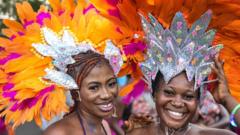The Calabar Carnival, known for being "Africa's biggest street party," saw a vibrant turnout in Nigeria's southern port city this weekend, as an estimated two million revellers gathered to celebrate the festive season. The carnival, which spans the entire month of December, is a highlight for many in the Cross River state, particularly among its Christian communities.
Calabar Carnival: Nigeria's Biggest Street Party Unites Cultures

Calabar Carnival: Nigeria's Biggest Street Party Unites Cultures
This weekend, Nigeria's Calabar Carnival brought together millions of festive participants for a dazzling display of culture, music, and tradition.
The event featured a colorful parade with floats and dancers from various ethnic groups across Nigeria. Reportedly, 14 bands showcased their talents through performances and competitions, adding to the carnival's lively atmosphere, much of which was set to the beat of popular Afrobeats tracks emanating from grand sound systems. "We are seeing different designs, different costumes," remarked attendee Grace Job, noting the high energy present at the event.
Costumes were a significant aspect of this year’s celebration, with some designs referencing the city's historical ties to the Atlantic slave trade. One artistically crafted costume paid homage to manillas, the brass bracelets that Portuguese traders used as a currency from the 16th to the 19th centuries. Another outfit, reminiscent of colonial history, depicted a giant British West Africa penny from the reign of George VI, a nod to Nigeria's independence in 1960.
Dancers, such as 25-year-old Rejoice Elemi, expressed pride in showcasing their traditions through vibrant performances. The carnival also featured notable Nigerian music artists, including Runtown and Iyanya, who entertained crowds during a concert. Calas Vegas emerged victorious, winning the title of best carnival band for the second consecutive year.
The significance of the carnival extends beyond mere entertainment; it serves as a strategic initiative for Cross River State to attract visitors from across Nigeria and abroad. This cultural spectacle not only celebrates local traditions but also enhances community bonds and cultural exchange among participants.
Costumes were a significant aspect of this year’s celebration, with some designs referencing the city's historical ties to the Atlantic slave trade. One artistically crafted costume paid homage to manillas, the brass bracelets that Portuguese traders used as a currency from the 16th to the 19th centuries. Another outfit, reminiscent of colonial history, depicted a giant British West Africa penny from the reign of George VI, a nod to Nigeria's independence in 1960.
Dancers, such as 25-year-old Rejoice Elemi, expressed pride in showcasing their traditions through vibrant performances. The carnival also featured notable Nigerian music artists, including Runtown and Iyanya, who entertained crowds during a concert. Calas Vegas emerged victorious, winning the title of best carnival band for the second consecutive year.
The significance of the carnival extends beyond mere entertainment; it serves as a strategic initiative for Cross River State to attract visitors from across Nigeria and abroad. This cultural spectacle not only celebrates local traditions but also enhances community bonds and cultural exchange among participants.



















